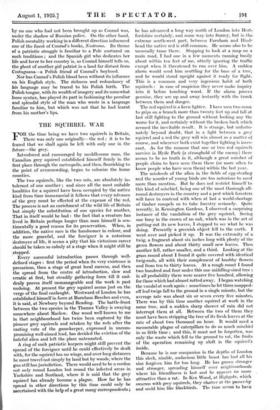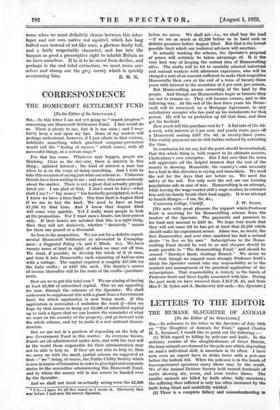THE SQUIRREL WAR
FOR the time being we have two squirrels in Britain. There was only one originally—the red ; it is to be feared that we shall again be left with only one in the future—the grey.
Introduced and encouraged by meddlesome man, the Canadian grey squirrel established himself firmly in the first place through the metropolis, and then, flourishing to the point of overcrowding, began to colonize the home counties.
The two squirrels, like the two rats, are absolutely in. tolerant of one another ; and since all the most suitable localities for a squirrel have been occupied by the native kind from time immemorial it follows that every advance of the grey must be effected at the expense of the red. The process is not an enrichment of the wild life of Britain but simply the substitution of one species for another. That in itself would be bad : the fact that a creature has lived in Britain perhaps longer than man himself is sen- itimentally a good reason for its preservation. When, in addition, the native race is the handsomer in colour, and 'the more graceful, and the foreigner is a notorious destroyer of life, it seems a pity that his victorious career should be taken so calmly at a stage when it might still be stopped. Every successful introduction passes through well- defined stages : first the period when its very existence is ,precarious, then a stage of great local success, and then the spread from the centre of introduction, slow and erratic at first, but steadily gathering force till it sud- denly proves itself unmanageable and the work is past undoing. At present the grey squirrel seems just on the verge of the final onslaught. Westward of London he has established himself in force at Burnham Beeches and even, it is said, at Newbury beyond Reading. The battle-front between the two species in the Thames Valley is swaying somewhere about Marlow. One wood well known to me in that neighbourhood has twice been captured by the pioneer grey squirrels and retaken by the reds after the casting vote of the gamekeeper, .expressed in uncom- promising well-aimed lead, has decided the eviction of the hateful alien and left the place untenanted. A ring of such patriotic keepers might still prevent the spread of the foreigner until he could effectively be dealt with, for the squirrel has no wings, and over long distances he must travel not simply by land but by woods, where the gun still has jurisdiction. There would need to be a cordon not only round London but round the infected areas in Yorkshire and Scotland, where it is said that the grey squirrel has already become a plague. How far he has 'spread in other directions by this time could only be ascertained with the help of a great many correspondents; he has advanced a long way north of London into Hert-. fordshire certainly, and some way into Surrey, but in the extreme south-west part, between Farnham and Hind- head the native red is still common. He seems also to be unusually tame there. Stopping to look at a map on a main road, I had one in a few moments running busily about within ten feet of me, utterly ignoring the traffic except when it threatened to run over him. A sudden alarm would send him scuttling for the base of a tree, and he would stand upright against it ready for flight. This is a common and very ingenious habit of both squirrels : in case of suspicion they never make inquiry into it before touching wood. If the alarm proves genuine, they are up and away instantly with the trunk between them and danger.
The red squirrel is a keen fighter. I have seen two come to grips on a branch more than twenty feet up and fall at last still fighting to the ground without looking any the worse for it, and certainly without the broken back which seemed the inevitable result. It is strange, but unfortu- nately beyond doubt, that in a fight between a grey squirrel and a red the grey will win almost as a matter of course, and wherever both exist together fighting is inces- sant. As for the rumour that one or two red squirrels survive in Hyde Park (a stronghold of the enemy) there seems to be no truth in it, although a great number of people claim to have seen them there (or more often to know people who have seen them) within the last year. The misdeeds of the alien in the fields of egg-stealing and the murder of young birds are too notorious to need more than mention. But he does not restrict himself to this kind of mischief, being one of the most thorough all- round destroyers in the country and a pest which foresters will have to contend with when at last a world-shortage of timber compels us to take forestry seriously. Quite recently, in Kensington Gardens, I observed a surprising instance of the vandalism of the grey squirrel. Seeing one busy in the crown of an oak, which was in the act of putting out its new leaves, I stopped to see what he was doing. Presently a greenish object fell to the earth. I went over and picked it up. It was the extremity of a twig, a fragment about six inches long with plenty of the green flowers and about thirty small new leaves. Then another fell, rather smaller, and a third. Looking at the grass round about I found it quite covered with identical twig-ends, all with their complement of knobby flowers and from ten to thirty leaves. At a rough count I found two hundred and four under this one middling-sized tree : in all probability there were nearer five hundred, allowing for those which had almost rotted away. I began watching the vandal at work again : sometimes he let three snapped off leaf-twigs fall to the ground in a single minute, but the average rate was about six or seven every five minutes. There was by this time another squirrel at work in the same tree, and a sudden sharp shower of rain did not interrupt them at all. Between the two of them they must have been stripping the tree of its fresh leaves at the rate of about two thousand an hour. It would need a memorable plague of caterpillars to do so much mischief in so little time ; and this, it must not be forgotten, was only the waste which fell to the ground to rot, the fruits of the operation remaining up aloft in the squirrel's inside.
Because he is our companion in the depths of London this sleek, nimble, audacious little beast has had all his sins forgiven him for too long. He has grown stronger and stronger, spreading himself over neighbourhoods where his friendliness is lost and he appears no more attractive than a rat. In Ken Wood, at Highgate, which swarms with grey squirrels, they chatter at the passer-by and scold him like blackbirds. The time seems to have come when we must definitely choose between this inter- loper and our own native red squirrel, which has long tufted ears instead of rat-like ones, a glorious bushy tail, and a fairly respectable character, and has into the bargain as good a prescriptive right to inhabit Britain as we have ourselves. If he is to be saved from decline, and perhaps in the end total extinction, we must rouse our- selves and stamp out the grey enemy which is quickly







































 Previous page
Previous page